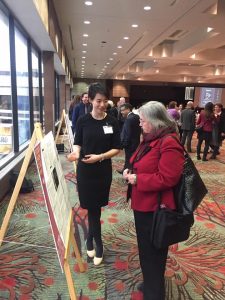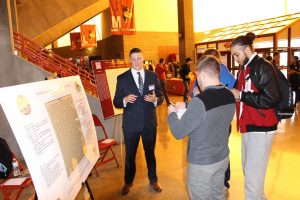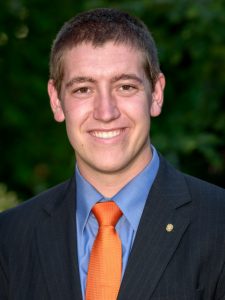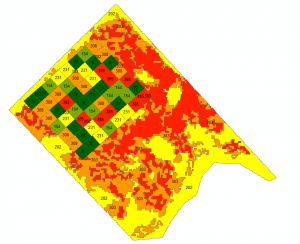In February 2017, we met with sixteen farmers, from Illinois to Ohio, to discuss their possible involvement in the DIFM project’s 2017 growing season. All of these farmers agreed to participate, and their harvest data is coming in soon!
Monthly Archives: October 2017
New Project Coordinator
 Caitlin McGuire joined the DIFM team as Project Coordinator in February 2017 following Krystal Montesdeoca’s departure. She received a BA from the University of California, Berkeley in English, and an MFA in Creative Writing at the University of Illinois, Urbana-Champaign. Please contact her at cmcguir3@illinois.edu.
Caitlin McGuire joined the DIFM team as Project Coordinator in February 2017 following Krystal Montesdeoca’s departure. She received a BA from the University of California, Berkeley in English, and an MFA in Creative Writing at the University of Illinois, Urbana-Champaign. Please contact her at cmcguir3@illinois.edu.
CyberGIS’ April Progress at the NCSA
The CyberGIS team has finished the first complete component of the DIFM application suite, the On-Farm Research Developer (OFRD). The key features of the OFRD software include rich capabilities for plot segmentation and field trial creation. The plot segmentation capability supports irregularly shaped fields and provides turning space around the edges of fields, which utilizes AB-line angle to create plots within an 80-foot internal buffer of each field boundary. This capability is applicable to both rectangular and irregularly shaped fields. The team has also implemented a shapefile download feature for application maps to allow users to examine their applications on their personal computers and input application data into their field machinery. The CyberGIS team is busy testing the new features and associated functionalities, and looking for testers. If you would like to be a tester, please contact Nathan Casler (ncasler@illinois.edu) and/or Shaowen Wang (shaowen@illinois.edu).
New Grad Student at UNL
 One of our new DIFM project members, Zhengzheng Gao, is pursuing a Master of Science in Agricultural Economics at the University of Nebraska Lincoln. Gao is from Beijing, China, and earned a Bachelor of Arts in Economics from the University of Minnesota Duluth. She is particularly interested in monetary and fiscal policy, environmental economics, and development economics in China.
One of our new DIFM project members, Zhengzheng Gao, is pursuing a Master of Science in Agricultural Economics at the University of Nebraska Lincoln. Gao is from Beijing, China, and earned a Bachelor of Arts in Economics from the University of Minnesota Duluth. She is particularly interested in monetary and fiscal policy, environmental economics, and development economics in China.
Undergraduate Research Experience

Benjamin Marks, DIFM Undergraduate Research Assistant, presented his poster entitled “The Farming Community’s Perspective on Nutrient Loss Reduction” at the annual Illinois State University Research Symposium on March 31. Ben has been working on the DIFM project with Dr. Maria Boerngen, Assistant Professor of Agribusiness at ISU, for the past year. He conducted a series of interviews with farmers from throughout McLean County, Illinois, to identify the agriculture community’s awareness of nutrient loss issues and the Illinois Nutrient Loss Reduction Strategy, the degree of concern farmers have about nutrient loss, how farmers obtain trusted information used in their management decisions, and what types of changes farmers have made in their practices in response to nutrient loss concerns. This effort has provided farmers a unique opportunity to share their first-hand perspective on the issues the DIFM project is addressing. Ben will be graduating with his bachelor’s degree in agribusiness in May 2017, and has accepted an industry position with Helena Chemical. His DIFM involvement will continue, however, as he and Dr. Boerngen are currently writing a manuscript based on his work with the local farming community.
Advisory Board Meeting 2017 in Champaign, IL
At our second annual Advisory Board Meeting at the DIFM House in Savoy, Maria Boerngen. David Bullock, Paul Davidson, Laura Gentry, Shaowen Wang, Laila Puntel, and Luis Rodriguez gave presentations about the project’s success to date. The Advisory Board was impressed – read their report for more information!
New Grad Student at UNL
 Gabe Stoll is the one of the newest grad students on the DIFM project. He is working on a M.S. in Agricultural and Biological Systems Engineering.
Gabe Stoll is the one of the newest grad students on the DIFM project. He is working on a M.S. in Agricultural and Biological Systems Engineering.
DIFM on the Radio
Dr. Maria Boerngen, assistant professor of agribusiness at Illinois State University, appeared on WJBC Radio’s Ag Hour (WJBC 1230 AM in Bloomington, Illinois) on Friday, April 28. During her interview, Maria spoke about the DIFM project and its goals, and publicized opportunities for local farmers to participate in field experiments in 2018 and 2019.
DIFM in Argentina

In Argentina we conducted experiments during the 2016-2017 growing season in two contrasting areas of the country: Buenos Aires and in Chaco province. Experiments in Buenos Aires have been harvested and had 18 trials total, with nitrogen and plant density done in separate trials. These fields are approximately 200 acres on average, with experiments taking place on 40 acres.
Pending Applications
Over the past summer, DIFM project members at the University of Illinois collaborated with researchers at Washington State University and Montana State University on three USDA-NIFA grants. Currently, we are waiting on hear back on the following applications in hopes of expanding the DIFM project in the coming years:
“Increasing Agricultural Resilence Through On-Farm Experimentation”
“A Workshop to Plan an International Cyber-Infrastructure for On-Farm Production Research”
“Advancing Wheat Nutrient Recommendations Using Statistical and Economic Models Developed Through On-Farm Research and Participatory Learning”

